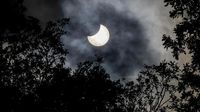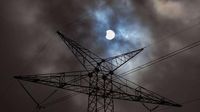On Saturday, March 29, 2025, a partial solar eclipse will captivate skywatchers across Germany, providing a stunning astronomical spectacle. As the new moon moves directly between the Earth and the sun around midday, it will partially obscure the sun's disk, creating a unique visual experience for observers.
This celestial event follows closely on the heels of a total lunar eclipse that took place on March 14, 2025, which was only partially visible in Germany. However, the upcoming solar eclipse promises to be more accessible, with optimal viewing conditions expected during the midday hours.
According to the German Astronomy House in Heidelberg, while the solar eclipse will not plunge the landscape into darkness like a total solar eclipse, it will still significantly alter the appearance of the sun. During this event, the sun will appear as a crescent, its bright light diminished, casting unusually sharp shadows on the ground.
Notably, the eclipse will be visible at different times across various cities in Germany, each experiencing a different level of coverage. The following are the key timings and coverage percentages for major cities:
- Cologne: 12:11 PM (20% coverage)
- Stuttgart: 12:11 PM (14% coverage)
- Frankfurt: 12:12 PM (16.5% coverage)
- Munich: 12:13 PM (10% coverage)
- Hannover: 12:16 PM (19% coverage)
- Hamburg: 12:18 PM (21% coverage)
- Dresden: 12:19 PM (12% coverage)
- Berlin: 12:21 PM (15% coverage)
In contrast, observers in Canada will witness a much more dramatic effect, with over 90% of the sun obscured during the eclipse, resulting in significantly darker daytime conditions.
As excitement builds for this astronomical event, meteorologists are advising caution regarding viewing conditions. Felix Dietzsch from the German Weather Service (DWD) has indicated that while Friday may see sunny weather, clouds are expected to roll in overnight, potentially obstructing views of the eclipse. The best chances for clear skies are predicted for the northern and northwestern regions of Germany, particularly along the North Sea coast.
“The chances of being able to observe the solar eclipse are not particularly good,” Dietzsch cautioned, noting that while there may be occasional breaks in the clouds, they will likely be short-lived and sporadic.
For those planning to watch the solar eclipse, safety is paramount. Directly looking at the sun, even when partially obscured, can lead to severe eye damage. Experts strongly recommend using certified solar eclipse glasses that comply with the DIN EN ISO 12312-2:2015 standard. Those using cameras, telescopes, or binoculars should also utilize special solar filters available at optical shops.
Another safe method of viewing the eclipse involves projecting the sun's image onto a light surface using binoculars or a pinhole camera, which can prevent eye injury. For those unable to witness the eclipse in person, the Society of German Planetariums (GDP) will provide a live stream of the event on their website.
Reflecting on the rarity of solar eclipses, Dr. Björn Voss from the Hamburg Planetarium explained that while the moon frequently passes between the Earth and the sun, it typically does so at an angle that does not result in an eclipse. Only when the celestial bodies align perfectly does a solar eclipse occur.
The last partial solar eclipse visible in Germany occurred in October 2022, while the previous total solar eclipse happened on April 8, 2024, although it was not visible in Central Europe. The last total solar eclipse in Germany was in August 1999, with the next one not expected until September 2081. For those eager for a total solar eclipse, a significant one will occur in Spain in mid-2026.
As the date approaches, skywatchers across Germany are preparing for this captivating display of nature. Whether through proper safety measures or viewing online, many are eager to experience the wonder of the cosmos.





